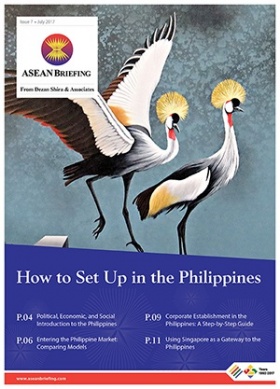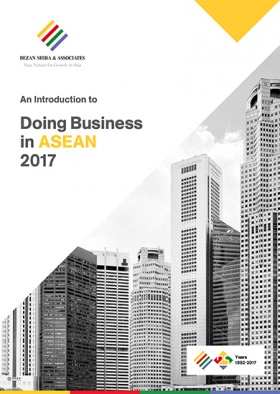Philippines Under Duterte: Opportunities and Risks
By Evonne Chiu and Benedict Alibasa at Grapevine Asia Partners
Economic Growth Under Duterte
In spite of President Rodrigo Duterte’s controversial ‘war on drugs’ and his acerbic language towards his critics, the Philippine economy continues to register robust growth. Latest economic data show that the Philippines’ gross domestic product (GDP) grew by 6.7% in 2017, marking the seventh straight year of GDP growth of more than 6%. Although the 2017 GDP growth was slightly below the 6.9% growth recorded in 2016, the Philippines remains one of Asia’s fastest-growing economies, only trailing behind China’s 6.9% and Vietnam’s 6.8%.
The 6.7% growth of last year was partly anchored by the government’s increased public spending. Data from the Philippine Statistics Authority (PSA) show that public construction posted a 12.6% growth in the third quarter of 2017. A primary driver of growth in public spending is Duterte’s ‘Build, Build, Build’ program. Improved public spending was also driven by higher utilization of cash allocation by government agencies.
 RELATED: The Philippines’ Investment Outlook for 2018
RELATED: The Philippines’ Investment Outlook for 2018
Public spending is expected to grow further under the Duterte administration with the upcoming rollout of big-ticket infrastructure projects, including the construction of the Mega Manila Subway, expansion of existing railway systems connecting Metro Manila to nearby provinces, and expansion of several airports across the Philippines, among others. The government’s infrastructure push is expected to benefit both local and foreign investors in the construction of these public facilities, which are expected to spur economic activity across business sectors.
Opportunities
As the Philippines’ economy continues on its growth trajectory, investment opportunities in the country are likely to open up across various sectors. Opportunities particularly abound in the infrastructure sector with as much as PHP 8 trillion worth of projects up for grabs for consultants, contractors, and developers. The demand for foreign expertise is expected to rise in the fields of technology, operations management, and funding of infrastructure development across the country. Transport infrastructure is at the center of the government’s development efforts, particularly in the capital Metro Manila, where transportation systems are decrepit, poorly maintained, and overburdened by ever-increasing congestion.
Also at the top of the Duterte government’s priorities is the development of the country’s telecommunications services, which is said to be one of the slowest and most expensive in the world. To spur the sector’s development, President Duterte has vowed to introduce a third, foreign-backed industry player to challenge the duopoly enjoyed by local industry giants Philippine Long Distance Telecommunications (PLDT) Co. and Globe Telecom. Local firms are reportedly seeking foreign partners from China, Taiwan, South Korea, Japan, and India to invest in the country’s telecoms sector to stir up competition and improve broadband and mobile internet services. Bidding for the country’s third telecom franchise is expected to open in July this year.
Contrary to initial concerns of a potential exodus of business process outsourcing (BPO) firms amid protectionist pronouncements of US President Donald Trump and President Duterte’s anti-US rhetoric, the Philippines’ BPO industry remains one of the world’s most vibrant and flourishing industries. Reports indicate that there are about a hundred international firms in talks with Philippine BPOs as they look to outsource their services not just in Metro Manila and Cebu, but also in Tier 2 and 3 cities such as Davao and Iloilo where new opportunities are emerging. BPO players’ move outside main urban centers is anchored by the government’s decentralization push, which should unlock land values in areas outside of Metro Manila and stimulate business activity in the countryside.
Real estate is likewise expected to benefit from the government’s infrastructure push. With the development of the country’s airports, seaports, and roads, increased access to suburban areas are likely to prompt businesses and people to move to these areas where real estate is relatively cheaper. Access to existing and emerging tourist spots would likewise be easier for both local and foreign tourists, which would consequently increase the demand for hotel rooms and other tourism-related businesses and services. Already, real estate developers have been active in constructing new developments in Cavite, Laguna, Bulacan, Pampanga, Iloilo, Bacolod, Davao, and Cagayan de Oro.
![]() RELATED: Pre-Investment and Market Entry Advisory from Dezan Shira & Associates
RELATED: Pre-Investment and Market Entry Advisory from Dezan Shira & Associates
Risks
Like other developing countries, however, the Philippines can be a challenging market for project owners and their foreign partners. This is especially the case in dealing with infrastructure projects, which involve government regulations, funding and interfaces with numerous agencies and departments. Compared with four other major ASEAN countries, the ease of doing business in the Philippines is ranked the lowest. The business operation environment in the Philippines is notably more challenging than the more mature ASEAN economies of Malaysia and Thailand. The Philippines ranks especially low in the areas of dealing with construction permits, securing credit and enforcing contracts. Difficulties in these areas will certainly pose great challenges and risks to those taking part in infrastructure projects.
Identifying local partners can likewise be risky if proper due diligence is not exercised. As in most emerging markets, many businesses in the Philippines are owned and managed by influential families that often have ties with the government. Such ties can be particularly risky for foreign partners that are bound by their home countries’ laws against foreign corrupt practices. The intertwining of business and politics in the Philippines is especially common in lucrative industries such as infrastructure, trade, and natural resources. It is also not uncommon for local enterprises in the Philippines to conceal and misrepresent information to secure overseas funding and investments. With bribery still prevalent in many government agencies, companies could easily circumvent local regulations and obtain bogus certifications. Hence, it is crucial for investors to have local insights on their local business partners’ backgrounds and interests as these could determine the success and failure of their investments in the country.
Although the Philippines boasts a competitive talent pool, hiring locals across all levels could still be a challenge from entry level positions to senior and executive roles. The main risk in employing locals is the veracity of the information declared in their CVs. As it is the case in most developing countries, counterfeit diplomas, certifications, and even identities are widely accessible in the Philippines, putting at risk the quality of a company’s manpower and exposing its operations to potential fraud.
Crime also remains a serious risk in many parts of the Philippines with theft, physical assault, and robbery most commonly reported to local authorities. Carjacking, robberies, and violent assaults also occur sporadically. Kidnapping is likewise a real threat in the country, with kidnap for ransom groups targeting both locals and foreigners. The risk of kidnapping of expatriates and locals is considered to be high, especially in the country’s restive areas. The risk levels of crime incidence in the Philippines, however, do vary in different places hence the importance of profiling a local area’s safety and security profile.
About Grapevine Asia Partners
Grapevine Asia Partners is a boutique risk consultancy firm with strong on-the-ground presence as well as in-house intelligence analysts in China and the Philippines.
Grapevine Asia Partners offers stakeholder mapping, regulatory and policy assessments, usually stemming from tightening industry regulations, as well as strengthening enforcement of commercial bribery, tax, environmental, and cyber security laws. The firm provides detailed analysis of the shifting operating landscape, outlining the motivations and intent of regulators and authorities at all levels, as well as recommendations on how best to manage regulatory challenges.
Evonne Chiu is a research, operational and management specialist. From 2005 to 2013, she developed a premier risk-consulting firm’s operations, as well as managed its due diligence, investigations, and security management projects in Greater China. Since 2014, Evonne has been a Managing Director of Grapevine Asia Partners.
Benedict Alibasa is Philippines Business Risk Consultant at Grapevine Asia Partners.
About Us
ASEAN Briefing is produced by Dezan Shira & Associates. The firm assists foreign investors throughout Asia and maintains offices throughout ASEAN, including in Singapore, Hanoi, Ho Chi Minh City and Jakarta. Please contact us at asia@dezshira.com or visit our website at www.dezshira.com.
- Previous Article Indonesia’s Investment Outlook for 2018
- Next Article Growing Opportunities for Manufacturing in ASEAN







